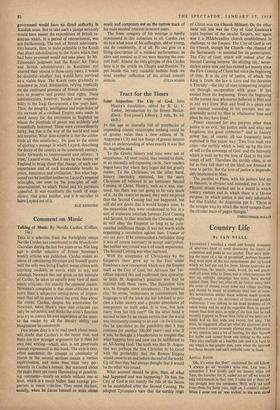Composite State
Kurds, Turks and Arabs. By C. J. .Edmonds. O.U.P., 42s.) ' THERE are really two books within the covers of this volume, with quite different subjects and appealing to quite different readers. The first is a detailed account of the topography, tribes, folk- lore and antiquities of southern Kurdistan where the author served for some years after the British occupation of Mesopotamia. The second book consists of the memoirs of a political officer and civil administrator. Though Mr. EdMonds served in a remote area, and was involved in affairs the substance of which seems now obscure' and for- gotten, the story he has to tell illustrates, for the reflective reader, the chancy and haphazard nature of political arrangements, on which so much depends for so many.
Iraq now cuts a figure as a leader of Arabism and as a principal producer of Middle Eastern oil. But to a substantial extent, Iraq is not an Arab country, and oil, the basis of its influence and prosperity, is mainly to be `found in a non-Arab area. Mr. Edmonds's book relates how southern Kurdistan came to be part of the Arab kingdom of Iraq. Such was not the intention at 'the out- set. When Faisal, an outsider, was imported to mount the throne of Iraq in 1921, the Kurds of Mesopotamia would have nothing to do with an Arab government. The Treaty of Sevres had promised them some kind of national State, and the British also had promised that Faisal and his government would have no direct authority in Kurdish areas. But to take such a pledge seriously would have meant the expenditure of British re- sources which, in a period of retrenchment, was not forthcoming. The task of British administra- tors became, then, to make palatable to the Kurds that direct subordination to the Arabs which they had been promised would not take place. In Mr. Edmonds's judgment had the Royal Air Force and British administrators in Kurdistan not exerted their utmost in those early years, it would be doubtful whether Iraq would have survived as a viable State. The Kurds came gradually to acquiesce in. Arab domination, relying implicitly on the continued presence of British administra- tors to preserve and protect their' rights. These administrators, however, handed over responsi- bility to the Iraqi Government a few years later. Thus, the integrity, intelligence and experience of the servants of a civilised Empire were made to stand surety for the extremists in Baghdad on whom the plenitude of power was suddenly and bountifully bestowed. These were extraordinarily lucky, but this is the way of the world and need not surprise. What does surprise is that the author finds all this satisfactory. He goes to the extent of quoting a passage in which Layard, describing the decay of the country in the nineteenth century, looks forwards to improvement and reform : 'I trust,' Layard wrote, 'that it may be the destiny, of England to bring about that change, of such vast importance and of such incalculable benefit to peace, commerce and civilisation.' But what hap- pened can be justified neither by Layard's imperial principles, nor even by the principles of self- determination, to which Faisal and his partisans appealed. It was manifestly the result of expe- diency, that great justifier, and it is seemlier to leave Layard out of it.
ELIE KEDOURIE































 Previous page
Previous page